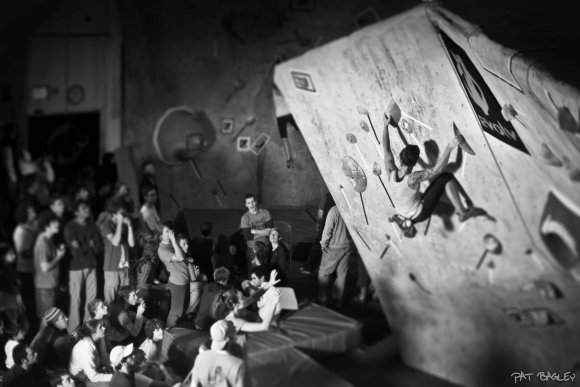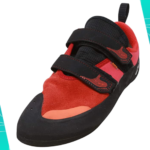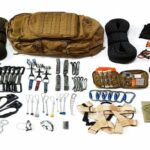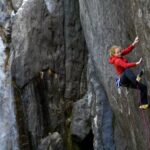In this piece of content, I will be sharing newbie climbing training tips, so stay tuned. When I first started climbing almost two years ago, Jackie Pettitt was my introduction. A beautiful, bespectacled, tattooed, tiny brick s%$t house. I walked into the gym for my basic safety course, and I remember her teaching me how to tie in, and being distracted by her impressive biceps, thinking, “Is this what I’m going to look like if I start climbing?” And, while I don’t look anything like Jackie just yet, I was excited to get the chance to work with her and get some training tips during the Women’s Climbing Clinics at one of our local gyms, MetroRock.

Jackie at Dark Horse Finals showing us what power looks like
Each week the clinics have a different topic, and this week was “Power”. Training for power is, as Jackie puts it “getting your muscles to work at 100%, and this includes the ability to pull off dynamic, explosive, and difficult moves in isolation.” MetroRock decided to organize these clinics for women, in part to help women focus in on areas, such as power, that many women struggle with. “I feel that women are naturally very aware of their bodies and how to move them intuitively, with balance,” says Jackie, “This body awareness makes women have the ability to avoid cutting feet, but, when we need to cut feet, we are not used to engaging the core, back, and shoulders.”
We have another amazing post sharing with you on Ice climbing.
This week I share with you some tips I learned, as a newbie, to develop more power. This post is obviously not inclusive of every single thing that goes into working power, which is a complex system, and we will continue to discuss it in future posts.
Newbie Climbing Training Tip #1: basic fitness skills.
I think the most important thing as a newbie, in order to maximize your benefit from the more climbing-specific training, is to build basic fitness skills. Especially if you are new to sports training and fitness in general like I am. If you can’t do a pull up, or your core strength is low, you may want to do some more general fitness training to bring up your overall baseline. See my newbie strength training and newbie pull-ups posts for some suggestions on how to do this and consider focusing on this as you weave in more training techniques that are climbing-specific.
This will really help you get the most out of training for power, and will also decrease your likelihood of injuring yourself.
Tip #2: Training Your Lock-off Strength Is Key To Power
“Locking-off” in terms of climbing and power is really about the ability to pull yourself into the wall, while at the same time grabbing for the next hold. When we say “locked off”, it means a position where your arms are bent, muscles are contracted, and your weight is largely being held by your arms, not your feet. So, for example, at the top of a pull-up, you are fully “locked off”, but you can also be in a locked off position when your arms are at 45, 90, and even 120 degrees (basically as long as they aren’t straight and you are pulling yourself into the wall, you’re good).
A good way to for us newbies to train our lock-off strength is to get on a climb that is relatively easy for you (so if you are a 5.9 climber, go ahead and hop on a 5.7) and on each hold pull up, and hold in the “locked-off” position for 5 seconds, before moving to the next hold, and then do the same thing on the next hold. Then lastly, down-climb.
Here’s an awesome training video that pro climber Galina Parfenov made of her training routine. Check out minute 2:30 for a visual of locking off on a hangboard, and then you could apply that movement to the workout I’ve suggested above (and also, just check out the whole video, she is CRAZY-strong, and has cool tips):
Tip #3: Campus Boards (And System Walls) Can Be Your Friend!
That is, with some caveats. As a new climber, you do need to be really careful not to get too crazy with the campus board, at first, to avoid straining your tendons. Taking that into consideration, there are some things that you can do with a campus board to help you train .
First, check out this great post where our fave training guru Steve Bechtel gives us a primer on using a campus board and system wall to train upper body strength. Next, if you can’t yet campus (which you probably can’t until you are climbing beyond say, 5.11), or if you can’t lock-off from a dead hang, consider some modifications that will help you get the benefit of increasing your strength without injury. For example, I learned from Jackie that just doing dead hangs on open palmed holds, like slopers, is still really good training for us newbs.
Largely because we tend to rely more on jugs, and also because most any deadhang training you do will be good for your climbing. Also, I learned you can always “cheat” (aka, give yourself “support”) for some of the moves by using one foot on the floor, or on a foot chip. All that being said, consider what will give you the most bang for your buck. If you need to give yourself a ton of support, or have your friend hold your butt up for you (we did this during our clinic and it was pretty amusing), go for it.
Doing this definitely won’t be detrimental to your climbing, but again, you might want to consider going back to some basics and focusing the bulk of your training on getting more physically fit and building core and upper body strength (a la Tip #1).
All-in-all taking this clinic really helped me understand more about the concept of “power” in climbing, and gave me some awesome tools to use to train, and reminded me to keep working on my general fitness, because that will for sure pay off in the area of power.
Being systematic in your training is important to improving, and it can always help to have a trainer providing you support, knowledge, and accountability (I know it helps me). That being said, if you’re interested in taking a women’s clinic at MetroRock, find the information her.
This series ends on August 8th, but there is still room, and if you miss this one, they will be starting another series in September! Additionally, Jackie, and all the trainers at Metro, are available for private lessons at really affordable rates and offers cool package deals that include personalized training plans. Lastly, if you don’t live near a place where all-female clinics are offered, consider mentioning your interest at your local gym. It was a great experience to train with a bunch of women, and as Jackie put it, “come together and train hard, while building climbing confidence without a bunch of dudes grunting and hollering with their shirts off.” Love it.
-Climb On!
Missy






